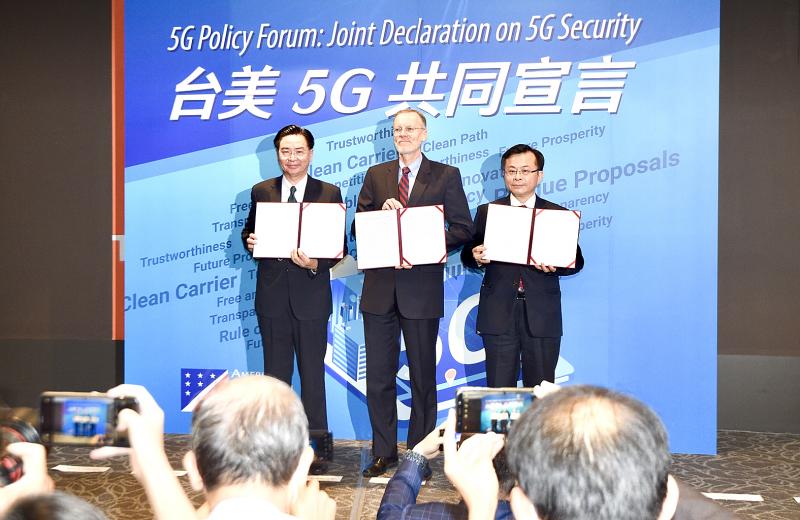The US is working with Taiwan to restructure global supply chains under the shared values of transparency and accountability, American Institute in Taiwan (AIT) Director Brent Christensen said, according to a transcript released by AIT yesterday.
Christensen made the remarks on Tuesday at the International Investment Forum in Taipei hosted by the Mergers and Acquisitions and Private Equity Council of Taiwan.
The COVID-19 pandemic has exposed the risks of over-reliance on one country or supplier for critical materials, such as medical supplies and pharmaceuticals, and for industries that are of strategic importance to shared economies, Christensen said.

Photo: Peter Lo, Taipei Times
Washington aims to diversify and bring supply chains closer to end users, and ensure that countries like China do not hold supply chains hostage for political purposes, he said.
The US works with like-minded partners, including Taiwan, Japan and the EU, to develop new supply chains based on shared values, he added.
Taiwan Semiconductor Manufacturing Co’s (TSMC, 台積電) plans to boost investment in the US send “an unmistakable signal that the future of high-tech supply chains remains in the US-Taiwan nexus,” Christensen said.
Highlighting the importance of accountability, transparency, reciprocity, respect for the rule of law and human rights, he said: “We would call these American values. We would also call them Taiwan values.”
At another forum in Taipei yesterday, the AIT and the Taipei Economic and Cultural Representative Office in the US issued a joint declaration on 5G security, echoing the Prague Proposals.
The Prague Proposals resulted from a 5G security conference hosted by the Czech Republic in May last year, and attended by officials and experts from more than 30 countries.
The US’ 5G Clean Path, announced by US Secretary of State Mike Pompeo in April, is an end-to-end communication that does not use any transmission, control, computing, or storage equipment from extremely problematic, untrusted IT vendors, such as Huawei Technologies Co (華為) and ZTE Corp (中興), Christensen said at yesterday’s forum.
The joint statement said that 5G suppliers should provide products and services that enable fair competition and downstream development by the maximum number of market participants.
It listed four criteria for evaluating 5G suppliers: Network hardware and software suppliers should not be subject, without independent judicial review, to control by a foreign government; suppliers should be financed openly and transparently; they should have transparent ownership, partnerships and corporate governance structures; and they should exemplify a commitment to innovation and respect for intellectual property rights.
Taiwan, on the front line of cyberdefense, has pre-emptively excluded hardware and software with cybersecurity risks, Minister of Foreign Affairs Joseph Wu (吳釗燮) said.
All of Taiwan’s 5G suppliers — Chunghwa Telecom Co (中華電信), Taiwan Mobile Co (台灣大哥大), Far EasTone Telecommunications Co (遠傳電信), Asia Pacific Telecom Co (亞太電信) and Taiwan Star Telecom Co (台灣之星) — are listed in the US’ Clean Path, showing that Taiwan is a trustworthy partner, he said.
The joint declaration signals that Taiwan-US cooperation in protecting cybersecurity has become institutionalized, Wu said, adding that Taiwan would continue to work with the US and other like-minded countries to develop 5G network standards.

CHAOS: Iranians took to the streets playing celebratory music after reports of Khamenei’s death on Saturday, while mourners also gathered in Tehran yesterday Iranian Supreme Leader Ayatollah Ali Khamenei was killed in a major attack on Iran launched by Israel and the US, throwing the future of the Islamic republic into doubt and raising the risk of regional instability. Iranian state television and the state-run IRNA news agency announced the 86-year-old’s death early yesterday. US President Donald Trump said it gave Iranians their “greatest chance” to “take back” their country. The announcements came after a joint US and Israeli aerial bombardment that targeted Iranian military and governmental sites. Trump said the “heavy and pinpoint bombing” would continue through the week or as long

TRUST: The KMT said it respected the US’ timing and considerations, and hoped it would continue to honor its commitments to helping Taiwan bolster its defenses and deterrence US President Donald Trump is delaying a multibillion-dollar arms sale to Taiwan to ensure his visit to Beijing is successful, a New York Times report said. The weapons sales package has stalled in the US Department of State, the report said, citing US officials it did not identify. The White House has told agencies not to push forward ahead of Trump’s meeting with Chinese President Xi Jinping (習近平), it said. The two last month held a phone call to discuss trade and geopolitical flashpoints ahead of the summit. Xi raised the Taiwan issue and urged the US to handle arms sales to

BIG SPENDERS: Foreign investors bought the most Taiwan equities since 2005, signaling confidence that an AI boom would continue to benefit chipmakers Taiwan Semiconductor Manufacturing Co’s (TSMC, 台積電) market capitalization swelled to US$2 trillion for the first time following a 4.25 percent rally in its American depositary receipts (ADR) overnight, putting the world’s biggest contract chipmaker sixth on the list of the world’s biggest companies by market capitalization, just behind Amazon.com Inc. The site CompaniesMarketcap.com ranked TSMC ahead of Saudi Aramco and Meta Platforms Inc. The Taiwanese company’s ADRs on Tuesday surged to US$385.75 on the New York Stock Exchange, as strong demand for artificial intelligence (AI) applications led to chip supply constraints and boost revenue growth to record-breaking levels. Each TSMC ADR represents

State-run CPC Corp, Taiwan (CPC, 台灣中油) yesterday said that it had confirmed on Saturday night with its liquefied natural gas (LNG) and crude oil suppliers that shipments are proceeding as scheduled and that domestic supplies remain unaffected. The CPC yesterday announced the gasoline and diesel prices will rise by NT$0.2 and NT$0.4 per liter, respectively, starting Monday, citing Middle East tensions and blizzards in the eastern United States. CPC also iterated it has been reducing the proportion of crude oil imports from the Middle East and diversifying its supply sources in the past few years in response to geopolitical risks, expanding